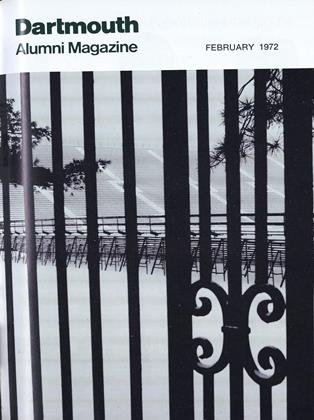By Robert E. Pike '25. Eatontown (N. J.): The H-HPress, 1971. Edition limited to 1000copies. 120 pp. $8 prepaid.
Mr. Pike loves burial grounds. In cities they are the coolest, quietest, and best-kept places. In the country, often on hilltops, they induce philosophic reflections about how Americans record on tombstones their fears and hopes, prejudices and prides, hates and loves, trials and triumphs. In this fascinating book Mr. Pike has focused his camera on the comedies and tragedies of life and death as found in graveyards.
Mr. Pike observes that most persons desire to inscribe for posterity what they did best. Samples: "She died a virgin." (Woburn, Mass.) "The Mother of Twenty-One Children by One Husband." (Boonville, Ind.) In Elgin, Minn., a husband, wife, and sons lie beneath this proud boast of their Republican loyalties: "None of us ever voted for Roosevelt or Truman." In Troy, Ala., an unreconstructed rebel dying at 82 was pleased to have, "Carved by Pink Parker in honor of John Wilkes Booth for killing old Abe Lincoln." In Oswego, N. Y., Charles Lewis had noted that at 50 he voted for Abraham Lincoln and died a Christian.
In Warrensville, Ill., a lawyer commemorated two wives who predeceased him and his third wife who outlived him with judiciously chosen adjectives: No. 1 "perfeet." No. 2 "Sweet." and No. 3 "Healthy" In St. Charles, Mo., an irate wife prophesied that the family mule some day would kick to death her drunken husband. The mule did and the widow immortalized her husband with a carved mule and whiskey bottle on the tombstone. The wife of another alcoholic who died of the D. T.'s had red snakes slithering stonily on the sides of the monument to commemorate her husband's last visions.
Those who enjoy life like to have that fact recorded. "Been here and Gone. Had a Good Time." (Macon, Ga.) In Mayfield, Ky., a colonel put up statues not only of himself but also of his mother, three sisters, four brothers, two grandnieces, a hound, a hunting dog, a deer, and a fox. To make sure he did himself justice he had erected a second statue of himself on horseback. He reserved the vault for himself alone over which he placed a double-barreled shotgun.
Poetry is favored on tombstones with rhymes sometimes a trifle forced. "Our Father lies beneath the sod/ His Spirit has gone to his God/ We never more shall hear his tread/ Nor see the Wen upon his head." (Colebrook, O.) In South Penobscot, Me., we may read: "Little Willie was a darling/ Willie was a dear/ Little did we think he'd pass/ When he ate that apple sass."
Scotland has produced only one Robert Burns and many unBurnsian moralists. In Alloway, Ayrshire, a tomb depicts Adam and Eve caught by God in the act of carnal sin in the Garden of Eden. Lying on her back. Eve with her hands is trying without complete success to cover her nakedness. Fleeing in terror, Adam is no longer his full self. As Mr. Pike notes, "An essential portion of Adam has been stolen, perhaps by a lady tourist, perhaps by a local collector. Ethically outraged, Burns might well utter, "A man's no a man for a' that."
 View Full Issue
View Full Issue
More From This Issue
-
 Feature
FeatureEDITING ROBERT FROST
February 1972 By EDWARD CONNERY LATHEM '51 -
 Feature
FeatureThe Growing Threat to Privacy Posed by Computer Data Banks
February 1972 By ROBERT P. HENDERSON '53 -
 Feature
FeatureTrustees Meet with Alumni Council
February 1972 -
 Feature
FeatureSymphony Conductor
February 1972 -
 Feature
FeatureExecutive Exporter
February 1972 -
 Feature
FeatureSnow Engineer
February 1972
JOHN HURD '21
-
 Books
BooksALL THE BEST IN THE CARIBBEAN.
January 1960 By JOHN HURD '21 -
 Books
BooksWOODSMOKE AND WATER CRESS.
JANUARY 1966 By JOHN HURD '21 -
 Books
BooksBITTERSWEET: COLLECTED VERSE.
JANUARY 1967 By JOHN HURD '21 -
 Books
BooksEIGHTEENTH CENTURY STUDIES PRESENTED TO ARTHUR M. WILSON.
NOVEMBER 1972 By JOHN HURD '21 -
 Article
ArticleRed, Cav, Tuss, and The Ferocious Cherub
December 1973 By JOHN HURD '21 -
 Books
BooksVERMONT ALBUM: A COLLECTION OF EARLY VERMONT PHOTOGRAPHS
December 1974 By JOHN HURD '21
Books
-
 Books
BooksAlumni Articles
MAY 1971 -
 Books
BooksFACTS AND FICTIONS ABOUT COINS.
MAY 1967 By DORAN A. JONES -
 Books
BooksBRITISH POLICY AND THE TURKISH REFORM MOVEMENT
May 1943 By E. B. Watson '02 -
 Books
BooksBURR OAKS,
February 1948 By F. Cudworth Flint. -
 Books
BooksTHE MAKING OF AN ARAB NATIONALIST: OTTOMANISM AND ARABISM IN THE LIFE AND THOUGHT OF SAT I' AL-HUSRI. "
JUNE 1972 By GENE R. GARTHWAITE -
 Books
BooksRELIGION AND CONDUCT
AUGUST 1930 By William Kilborne Stewart

